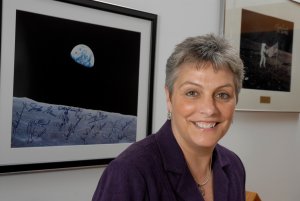Presented By: Aerospace Engineering
AE200 Seminar Series: Extreme Physiology: Engineering meets Physiology in Space

Kathryn Clark
Associate Chair
Department of Movement Science
School of Kinesiology
University of Michigan
Space enthusiasts have been talking about going to Mars since we launched the first astronauts into space. We have not actually travelled very far from our home planet and we are only beginning to understand physiological changes and the potential for using science and engineering to overcome those challenges. For example, we know we on Earth are protected by the van Allen belts. Can we find a way to protect astronauts who travel beyond the 36,000 miles of van Allen belt coverage from the radiation? Can we overcome the loss of blood cells, muscle mass, proprioception, and immune system function? Some of these are scientific questions; others are engineering problems to solve. NASA and her international partners must work together to solve these problems if we are ever to travel back to the Moon, on to Mars, and beyond. This generation of scientists and engineers are going to be the people who overcome these challenges. A side benefit is for people all over the world to overcome differences and work together on this greatest of adventures.
About the speaker...
Dr. Clark is currently the Associate Chair of the Department of Movement Science in the School of Kinesiology here at UM. She is also an Adjunct Associate Research Scientist in the Department of Aerospace Engineering. However, these are both “retirement jobs” as she spent most of her career at NASA headquarters, first as the International Space Station (ISS) Senior Scientist and then as the Chief Scientist for Human Space Flight. She worked with scientists from all over the world to communicate research needs and identify areas for international collaboration. Her particular interest was in “Human Factors”, all the elements necessary for the health, safety, and efficiency of crews in space. One of the primary tasks was to identify the problems associated with long-duration space flight and use the ISS to find solutions to those problems. These include biological countermeasures for the undesirable physical changes as well as the psychological issues that may occur in response to the closed, dangerous environments while traveling in space or living on other planets. One result of this work was a talk she gave regularly on the speakers’ circuit called, “The 55 Reasons We Can’t Go.”
Associate Chair
Department of Movement Science
School of Kinesiology
University of Michigan
Space enthusiasts have been talking about going to Mars since we launched the first astronauts into space. We have not actually travelled very far from our home planet and we are only beginning to understand physiological changes and the potential for using science and engineering to overcome those challenges. For example, we know we on Earth are protected by the van Allen belts. Can we find a way to protect astronauts who travel beyond the 36,000 miles of van Allen belt coverage from the radiation? Can we overcome the loss of blood cells, muscle mass, proprioception, and immune system function? Some of these are scientific questions; others are engineering problems to solve. NASA and her international partners must work together to solve these problems if we are ever to travel back to the Moon, on to Mars, and beyond. This generation of scientists and engineers are going to be the people who overcome these challenges. A side benefit is for people all over the world to overcome differences and work together on this greatest of adventures.
About the speaker...
Dr. Clark is currently the Associate Chair of the Department of Movement Science in the School of Kinesiology here at UM. She is also an Adjunct Associate Research Scientist in the Department of Aerospace Engineering. However, these are both “retirement jobs” as she spent most of her career at NASA headquarters, first as the International Space Station (ISS) Senior Scientist and then as the Chief Scientist for Human Space Flight. She worked with scientists from all over the world to communicate research needs and identify areas for international collaboration. Her particular interest was in “Human Factors”, all the elements necessary for the health, safety, and efficiency of crews in space. One of the primary tasks was to identify the problems associated with long-duration space flight and use the ISS to find solutions to those problems. These include biological countermeasures for the undesirable physical changes as well as the psychological issues that may occur in response to the closed, dangerous environments while traveling in space or living on other planets. One result of this work was a talk she gave regularly on the speakers’ circuit called, “The 55 Reasons We Can’t Go.”